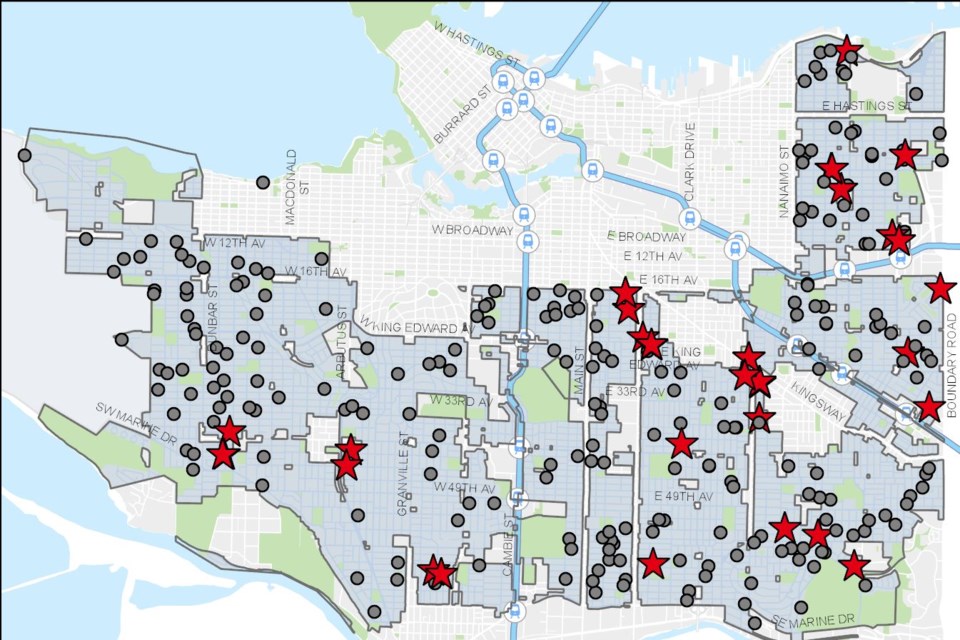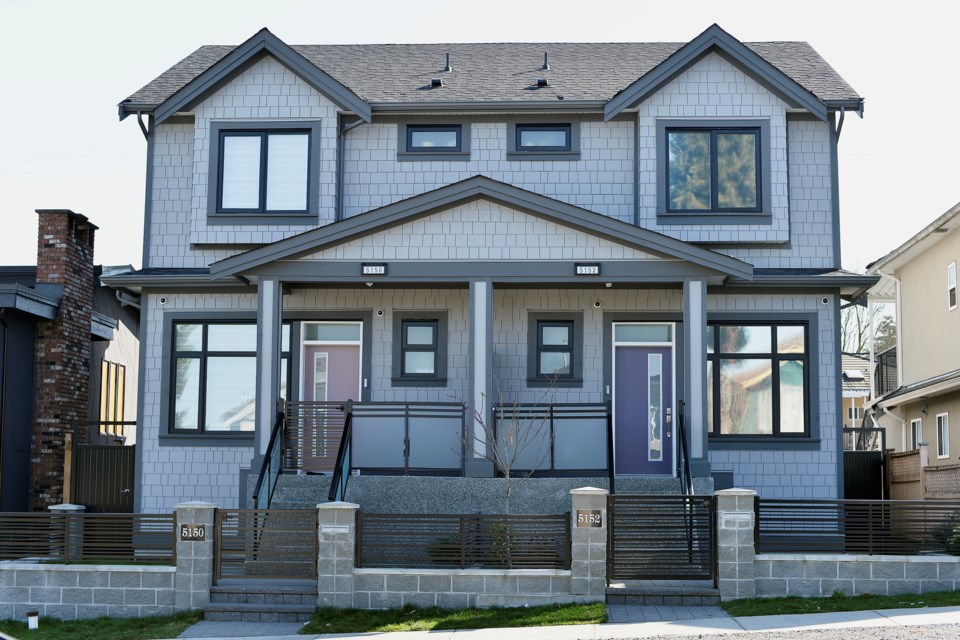While duplexes are now allowed in most of the Vancouver’s single-family neighbourhoods — a once controversial idea — only a “modest” number of applications have been submitted.
Between last October and the end of March, a six-month period, the City of Vancouver received 35 applications for duplexes compared with 227 for new single-family homes. That translates to about 13 per cent of total applications.
The majority have been for East Vancouver properties.
Last September, following a contentious debate at the end of its term, the Vision-led council approved duplexes in most single-family neighbourhoods in a 7-4 decision.
(They were already allowed in some areas of the city, including areas of Grandview-Woodland and Mount Pleasant, but they only accounted for about 1.6 per cent of the housing stock.)
In December, the newly elected council decided not to reverse the September decision. Instead, council voted to allow duplexes to remain an option on a trial basis with staff tracking data about their uptake and reporting back to council regularly. If applications for duplexes reach 5 per cent of all RS (single-family) lots — about 68,000 — each year, council said it would reconsider its decision. Further discussion and analysis about duplexes will also be a topic in the city-wide plan process.
The new regulations allowing duplexes, which can be in a range of styles — front/back, side-by-side or up-down unit configurations and with or without small lock-off suites — have limits. Duplexes are only an option for new construction, and an increase in floor area over what’s currently permitted isn’t allowed. Laneway houses are also not allowed in conjunction with duplexes.
Senior planner Paula Huber told the Courier in an email that the new duplex option is performing as expected. She said it was designed to introduce “modest change neighbourhoods and to provide an alternative to those already considering demolishing and building a new house.”
“The duplex regulations in RS zones do not allow an increase in floor area over what is currently allowed for new houses (0.7 FSR), nor does it allow duplex in conjunction with a laneway house. These measures were included intentionally so that duplex would not outcompete laneway houses or the character incentives program introduced in January 2018,” she wrote. “For these reasons, we anticipated a modest uptake and this is what we are seeing so far.”
Huber indicated staff are hearing from builders that they are choosing to build a duplex because they cost less than a new house, therefore more people can afford to buy them. Staff are also hearing that clients are choosing a duplex instead of a house because it allows them to partly fund the construction through the sale of the second unit.
City council has been updated about duplex numbers each month and a staff report on the trial is also expected to be presented at the end of the year.
"Looking forward, we anticipate that houses will continue to be the most financially attractive option for new builds in most neighbourhoods," Huber added.

The divisive debate over duplexes pitted those who supported the option, and who thought moves to densify single-family neighbourhoods should be more aggressive, against those who argued there wasn’t enough consultation, character homes would be torn down to make way for duplexes, and duplexes wouldn’t produce what’s needed — housing that’s affordable for the average resident.
New duplexes can be pricey. Last year, before housing prices started to drop, city staff estimated new East Side duplexes would go for about $1.2 million, while West Side ones would go for upwards of $2.5 million, which would appeal to households earning upwards of $150,000 — about 15.5 per cent of city households.
Staff stressed the rationale for allowing duplexes wasn’t based on affordability — although duplexes are typically cheaper than single-family homes — but to increase housing options since one of the city’s “Making Room” program objectives is to increase the supply of housing types for those who can’t afford detached homes.

Green Party Coun. Adriane Carr, who voted against the duplex motions, has reservations about their effectiveness in responding to housing problems Vancouver faces.
Carr wonders whether those who have applied to build duplexes had already planned to build a new house and switched to a duplex based on the new regulations, or if the policy simply enticed more teardowns, which she said can result in affordable suites being lost and is bad for the environment. Carr said the policy might have some merit if the former is the case, but she has problems with it if the latter is true.
“That’s the problem I expressed right from the beginning, which is, I think, we have failed in our policy to retain single-family homes and add in density into the single-family homes through renovations, and incentivise those renovations…,” she said.
City staff told the Courier there’s not enough data to indicate trends at this point, but since single-family remains the most financially rewarding option in most parts of the city, it’s very unlikely the duplex opportunity incentivized anyone to purchase a site to develop that they would not have otherwise purchased to redevelop as a single-family home.
Carr, meanwhile, maintains if homes are large enough and if they have character, more suites should be allowed.
“I had hoped the whole policy wouldn’t have gone towards duplex zoning but towards a better and much more enticing plan to retain character homes and add in more suites. People I talked to said you really could, in many of these homes, put in suites that are on the main floor, in the basement, and even upper-level suites. You see that in Kitsilano. Therefore you can get a lot more density onto a lot — mostly a lot more rental as well.”
Carr maintains council and staff’s time and attention should be focused on programs and policies that create more affordable rental housing since more than half of Vancouverites rent.
“We’ve missed the boat on that and the duplex is not delivering more affordability. They deliver a different type of housing but I think we’ve got to focus on the challenge of really affordable homes for people, not just different homes.”
Reilly Wood, a director of Abundant Housing Vancouver, which lobbied in favour of duplexes, said he isn't surprised application numbers are so low.
"The allowable density of new duplexes was intentionally kept low to avoid triggering significant redevelopment — not the choice I would have made," he told the Courier.
"The duplex program is a sad example of how difficult it is to make any progress on housing in Vancouver. This was a tiny change, and people fought it tooth and nail — that makes it really hard for staff and council to propose any bold changes."



